
Eucalyptus polybractea, commonly known as the blue-leaved mallee or simply blue mallee, is a species of mallee that is endemic to south-eastern Australia. It has rough, fibrous or flaky bark on the lower part of the trunk, smooth greyish or brownish bark above, lance-shaped adult leaves, flower buds in groups of between seven and eleven, white flowers and cup-shaped or barrel-shaped fruit.

Eucalyptus notabilis, commonly known as Blue Mountains mahogany or mountain mahogany, is a species of small to medium-sized tree endemic to eastern Australia. It has rough, fibrous bark on the trunk and branches, lance-shaped to curved adult leaves, flower buds in groups of between seven and eleven, white flowers and hemispherical or conical fruit.
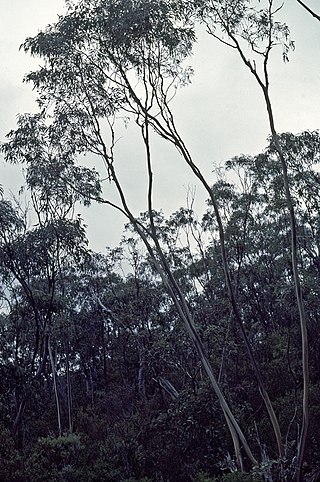
Eucalyptus saxatilis, commonly known as the Suggan Buggan mallee or Mount Wheeler mallee, is a species of mallee or small tree that is endemic to southeastern Australia. It has smooth bark that is shed in ribbons, lance-shaped to curved adult leaves, flower buds in groups of three, white flowers and bell-shaped fruit.
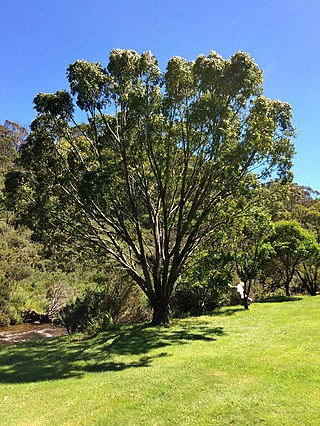
Eucalyptus stellulata, commonly known as black sallee or black sally, is a species of small tree or a mallee that is endemic to higher altitude regions of south-eastern Australia. it has rough bark on the lower part of the trunk smooth greenish bark above, lance-shaped to elliptical leaves, flower buds in group of between nine and fifteen, white flowers and cup-shaped or shortened spherical fruit.

Eucalyptus moorei, commonly known as narrow-leaved sally, is a species of mallee that is endemic to New South Wales. It has smooth bark, linear to narrow lance-shaped or curved adult leaves, flower buds in groups of between seven and fifteen, white flowers and cup-shaped or shortened spherical fruit.

Eucalyptus parvula, commonly known as small-leaved gum, is a species of small tree that is endemic to south-eastern New South Wales. It has mostly smooth bark, elliptical to lance-shaped adult leaves but with many juvenile of intermediate leaves in the crown, flower buds in groups of seven, white flowers and cup-shaped fruit.

Eucalyptus dendromorpha, the Budawang ash or giant mallee ash is a species of tree endemic to southeastern Australia. It has rough, compacted bark on the lower part of the trunk, smooth white to cream-coloured bark above, lance-shaped to curved adult leaves, flower buds in groups of between seven and eleven, white flowers and cup-shaped or barrel-shaped fruit.
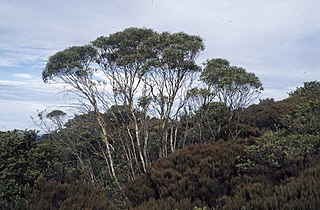
Eucalyptus kybeanensis, commonly known as the Kybean mallee ash, is a species of mallee or tree that is endemic to south eastern Australia. It has smooth, white or greyish bark, lance-shaped adult leaves, flower buds in groups of seven, nine or eleven, white flowers and conical or hemispherical fruit.

Eucalyptus benthamii, commonly known as Camden white gum, Bentham's gum, Nepean River gum, kayer-ro or durrum-by-ang, is a species of tree that is endemic to New South Wales. It has mostly smooth bluish grey or white bark, lance-shaped to curved adult leaves, flower buds arranged in groups of seven, white flowers and cup-shaped, bell-shaped or conical fruit.
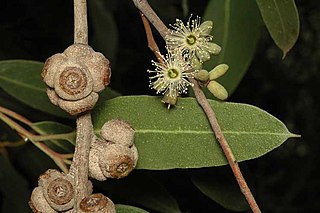
Eucalyptus bensonii, commonly known as Benson's stringybark, is a small tree or mallee that is endemic to New South Wales. It has rough grey or brown stringy bark on the trunk and larger branches, smooth bark on the thinnest branches, broadly lance-shaped to egg-shaped adult leaves, flower buds arranged in groups of seven, nine or eleven, white flowers and cup-shaped or hemispherical fruit in clusters.

Eucalyptus magnificata, commonly known as blue box or northern blue box, is a species of small tree or sometimes a mallee that is restricted to a small area of New South Wales. It has rough, fibrous or flaky bark on the trunk and larger branches, smooth bark above, broadly lance-shaped to egg-shaped leaves, flower buds in groups of seven, white or pale yellow flowers and conical fruit.

Eucalyptus nandewarica, commonly known as mallee red gum, is a species of tree or mallee that is endemic to a small area of western New South Wales. It has mostly smooth bark, lance-shaped adult leaves, flower buds in groups of three or seven, white flowers and cup-shaped or hemispherical fruit.

Eucalyptus gillenii, commonly known as the mallee red gum, Mt Gillen mallee or Mt Lindsay mallee, is a species of mallee that is endemic to inland Australia. It has smooth, mottled bark, linear to narrow lance-shaped adult leaves, flower buds in groups of seven or nine, white flowers and hemispherical or cup-shaped fruit.
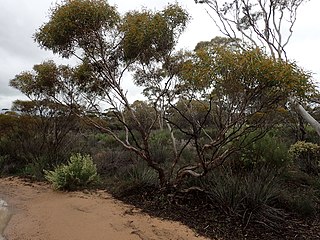
Eucalyptus yilgarnensis, commonly known as yorrell or yorrel, is a species of mallee, rarely a small tree, that is endemic to Western Australia. It usually has rough bark on the trunk, smooth bark above, linear to narrow elliptical or narrow lance-shaped adult leaves, flower buds in groups of seven or nine, white flowers and barrel-shaped fruit.
Eucalyptus filiformis is a species of mallee that is endemic to a small area on the side of a mountain in Victoria, Australia. It has rough fibrous or flaky bark on the trunk, smooth bark above, narrow lance-shaped to narrow elliptical adult leaves, flower buds usually in groups of seven, white flowers and barrel-shaped fruit.
Eucalyptus kabiana, commonly known as Mt Beerwah mallee, is a species of mallee, rarely a small tree, that is endemic to Queensland. It has smooth white to grey bark, sometimes with a short stocking of rough, fibrous bark at the base. The adult leaves are lance-shaped or curved, the flower buds are arranged in groups of between seven and eleven, the flowers are white and the fruit is hemispherical with protruding valves.
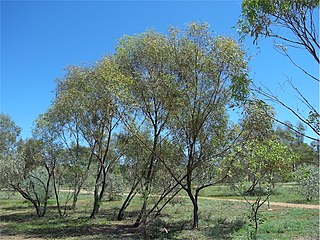
Eucalyptus normantonensis, commonly known as Normanton box, is a species of mallee, rarely a small tree, that is endemic to northern Australia. It has rough, fibrous or flaky bark on some or all of the stems, lance-shaped to curved adult leaves, flower buds in groups of between seven and eleven, white flowers and cylindrical, barrel-shaped or shortened spherical fruit.

Eucalyptus pumila, commonly known as the Pokolbin mallee, is a species of mallee that is endemic[ to New South Wales. It has smooth bark, lance-shaped to curved or elliptical adult leaves, flower buds in groups of seven, white flowers and hemispherical or cup-shaped fruit.
Eucalyptus tardecidens is a species of mallee or small tree that is endemic to north Queensland. It has rough, fibrous or flaky bark on the trunk and branches, lance-shaped adult leaves, flower buds in groups of seven, white flowers and shortened oval to cylindrical fruit.
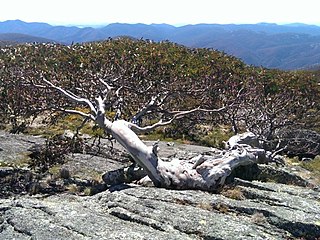
Eucalyptus pauciflora subsp. debeuzevillei, commonly known as Jounama snow gum, is a mallee or small tree that is native to a few mountain peaks in south-eastern Australia. It has smooth, shiny bark, glossy green lance-shaped to egg-shaped leaves, flower buds in groups of between nine and fifteen, white flowers and hemispherical or conical fruit. It differs from other subspecies of E. pauciflora in having angular flower buds.



















